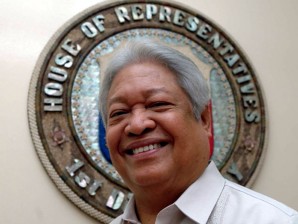Lagman cites history to justify Arroyo’s request for house arrest
History may offer a guide to friends and foes alike of former President and now Pampanga Representative Gloria Macapagal-Arroyo on the issue of what should be done with her as she faces a charge of electoral sabotage: Keep her in a regular jail or place her under house arrest?
For example, what do Augusto Pinochet, Paris Hilton, Nikita Khrushchev, Aung San Suu Kyi and Galileo Galilei have in common?
All of them were allowed to be placed under house arrest, according to House Minority Leader Edcel Lagman, who has dug long and deep, from medieval to modern times, in search of historical figures to justify house arrest for the Pampanga representative.
“Hospital and house arrests are accepted detention measures in lieu of prison confinement, particularly during the pretrial and preconviction phases of criminal prosecution,” Lagman said in a statement on Monday.
“Pending final conviction, detention is not a punitive action but a custodial safeguard,” he added.
Article continues after this advertisementArticle continues after this advertisement
Straight to jail
Opponents of Arroyo, however, may also cite instances in history when, despite their stature, some national leaders in South Korea and Taiwan ended up going straight to jail to await their trials.
Take the case of former South Korean President Roh Tae-woo, who was arrested in November 1995 on charges of accepting over $300 million in bribes from businessmen during his rule from 1988 to 1993. From the prosecutor’s office, where he was held overnight, Roh was whisked away to a solitary cell in the Seoul Detention Center.
The following year, Roh was convicted and sentenced to 22 years imprisonment. President Kim Young-sam pardoned him in 1997 in a move toward national reconciliation.
In December 1995, another former South Korean president, Chun Doo-hwan, was arrested for ordering a crackdown on protesters that left hundreds of people dead. From his home, Chun was taken to prison. Initially condemned to death, he was also pardoned and freed by Kim in 1997.
Another case was that of former Taiwan President Chen Shui-bian, who was arrested on corruption charges in November 2008. He was jailed while awaiting trial and sentenced to life imprisonment in September 2009. Taipei’s High Court later reduced the jail term to 20 years.
Chen is still in prison.
Galileo Galilei
Lagman made no mention of such instances in his statement, which was part of the Arroyo’s camp drive to gather support in its efforts to keep her from being detained in a regular jail while the Pasay City Regional Trial Court hears the case against her.
Lagman noted that Italian astronomer Galileo Galilei was placed by the Catholic Church under house arrest in his villa, until he died in 1642, for supporting Copernicus’ theory that Earth was not the center of the universe. At the time of his arrest, he was 69 years old.
Lagman also cited the house arrest of the American hotel heiress Hilton (for reckless driving), business magnate Martha Stewart (for insider trading) and 1991 Nobel Peace Prize winner Aung San Suu Kyi of Burma (Myanmar) to boost his case.
Aside from Chile’s former President Pinochet and the late Soviet Premier Khrushchev, other national leaders placed under house arrest were Algeria’s President Ahmed Ben Bella, former Argentine President Jorge Videla, former Egyptian President Mohammad Naguib, Indonesia’s President Sukarno, Iran’s former Premier Mohammad Mosaddegh and Nigeria’s President Shehu Shagari.
The list also included former Tunisian President Habib Bourguiba, former Tunisian King Muhammad VIII al-Amin, and former Chinese leader Zhao Zhiyang.
Straight to jail
Aside from these historical precedents, Lagman argued Arroyo deserved better treatment because the legality of the joint panel of the Department of Justice and the Commission on Elections which filed the electoral sabotage case against her, was still being questioned in the Supreme Court.
Moreover, Arroyo has the right to post bail because the evidence against her is weak or “hearsay and uncorroborated,” according to Lagman. With reports from Lawrence de Guzman and Mariel Medina, Inquirer Research
